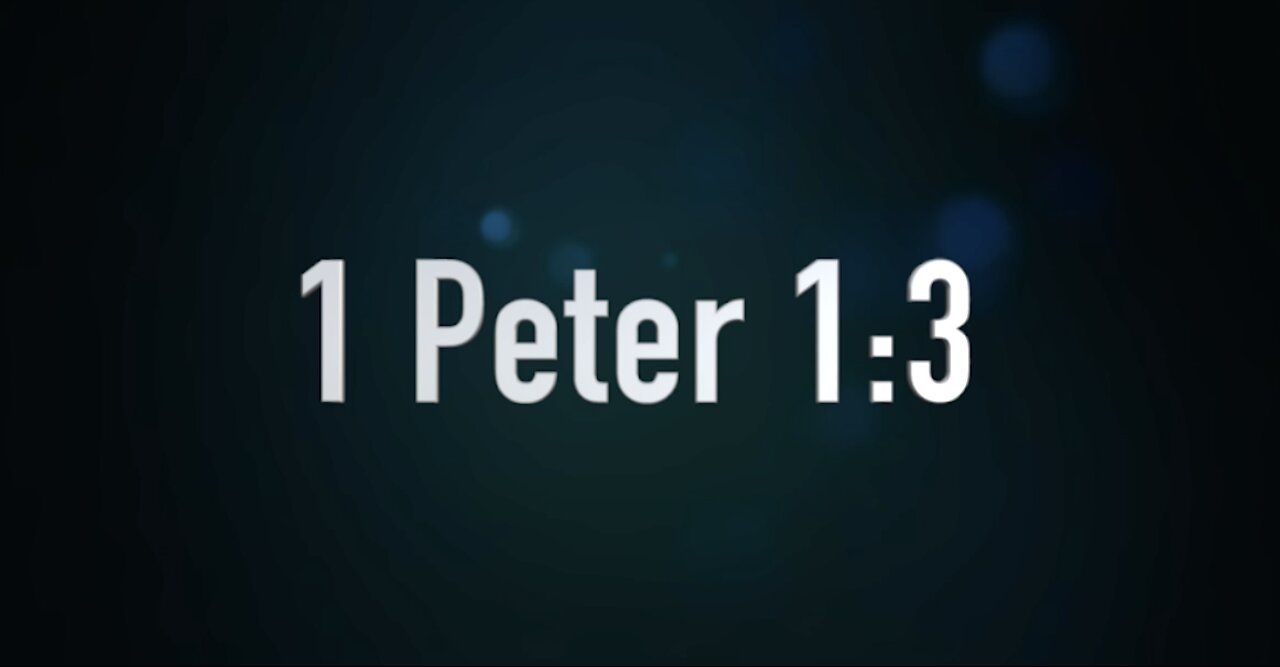Premium Only Content

1 Peter 1:3
Michael Adkins
*CHRIST, OUR LIVING HOPE*
1 Peter 1:3 (NIV)
“Praise be to the God and Father of our Lord Jesus Christ! In his great mercy he has given us new birth into a living hope through the resurrection of Jesus Christ from the dead.”
*BACKGROUND/CONTEXT*
As Peter beings his epistle, 1 Peter 1:3-12 introduces the major themes of the letter. We also find that these verses constitute one long sentence in the Greek, separated by various clauses and subclauses in the language, which all refer back to the first phrase “Praise be to the God and Father of our Lord Jesus Christ.” The major clauses can be separated as follows:
(vss 3-5) blessing God because he has given believers new life and guaranteed their future glory
(vss 6-7) believers can rejoice even in suffering for it purifies them, for their ultimate salvation is sure
(vss 8-12) the present and ultimate salvation is the plan and goal of God as revealed to the prophets
Essentially, 1 Peter 1:3-12 is one long praise to God.
First Peter 1:3-5 takes on the form of a doxology, a hymn or statement of praise and blessing to God. It is a liturgy which was meant to be memorized and recited in public and private worship. It is possible that Peter was beginning his letter by quoting a common doxology used for worship in early Christian churches.
*IN PRAISE OF GOD*
_Praise be to the God and Father of our Lord Jesus Christ!_
This phrase begins with a Jewish form of blessing called a “berakhah”. A berakhah (blessing) is a special kind of prayer that is very common in Judaism. It is frequently recited in synagogue services, and in daily prayers. All berakhahs word _barukh_, which means blessed or praised.
In the Greek, word translated “praise” is (Gr: _eulogētos_) which means to speak well of, bless, praise or adore. It is also where we get our English word eulogy, or eulogize, which means to remember and speak well of.
All praise goes to God and no one else – The Father, the Son and the Holy Spirit. As we read yesterday all three persons of the Godhead had an integral part of our salvation.
*THE MERCY OF GOD*
_In his great mercy_
The Greek for “mercy”: (Gr: _eleos_) means pity and compassion, showing kindness toward someone in need. Larry Richards in his Expository Dictionary of Bible Words writes: “Originally (_eleos_) expressed only the emotion that was aroused by contact with a person who was suffering. By NT times, however, the concept incorporated a compassionate response. A person who felt for and with a sufferer would be moved to help. This concept of mercy--as a concern for the afflicted that prompts giving help--is prominent in both the Gospels and the Epistles.”
As sinners, we needed redemption, and God had mercy on us. Paul wrote in Ephesians 2:4-6: “But because of his great love for us, God, who is rich in mercy, made us alive with Christ even when we were dead in transgressions—it is by grace you have been saved. And God raised us up with Christ and seated us with him in the heavenly realms in Christ Jesus.”
And to his disciple Titus he wrote: “But when the kindness and love of God our Savior appeared, he saved us, not because of righteous things we had done, but because of his mercy.” Titus 3:4-5
*A NEW BIRTH*
_he has given us new birth_
Peter uses the word (Gr: _anagennaō_) which basically means to give new birth, cause to be born again. This is word is very similar to the word used by Jesus in his conversation with Nicodemus when he talks about being “born again”
Born: (Gr: _gennaō_) which means to bear, or give birth to
Again (Gr: _anōthen_) which means from above, anew, all over again.
“Jesus replied, ‘Very truly I tell you, no one can see the kingdom of God unless they are born again.’
‘How can someone be born when they are old?’ Nicodemus asked. ‘Surely they cannot enter a second time into their mother's womb to be born!’
Jesus answered, ‘Very truly I tell you, no one can enter the kingdom of God unless they are born of water and the Spirit. Flesh gives birth to flesh, but the Spirit gives birth to spirit. You should not be surprised at my saying, You must be born again. The wind blows wherever it pleases. You hear its sound, but you cannot tell where it comes from or where it is going. So it is with everyone born of the Spirit.’” John 3:3-8
The concept of being “born again” was a revolutionary concept. In our first birth, we are born into a specific identity, citizenship, socioeconomic class, and the physical aspects that people receive at birth. However, New Birth implies that Christians have a new identity and character that redefines their relationship with God and with society (the world). Peter looks to what God has already done by raising Jesus from the dead (v. 3), to the present preservation of those who are God’s (v. 5), and to the future inheritance when salvation is fully revealed (v. 5).
*A LIVING HOPE*
_into a living hope_
Christ is indeed our “living hope.” He is alive and seated on his throne in heaven (Heb 12:12, Rev 3:21). The key to this phrase is not that we have hope, rather it is who we put our hope in -- the *Lord Jesus Christ*, who IS our living hope. While we often think that hope is only in our future expectations, Edmund P. Clowney writes in his commentary on 1 Peter: “Our hope is anchored in the past: Jesus rose! Our hope remains in the present: Jesus lives! Our hope is completed in the future: Jesus is coming! (1:5, 7, 13).”
Charles Spurgeon also tells us: “It is also called a ‘living hope,’ because it is imperishable. Other hopes fade like withering flowers. The hopes of the rich, the boasts of the proud, all these will die out as a candle when it flickers in the socket. The hope of the greatest monarch has been crushed before our eyes; he set up the standard of victory too soon, and has seen it trailed in the mire. There is no unwaning hope beneath the changeful moon: the only imperishable hope is that which climbs above the stars and fixes itself upon the throne of God and the person of Jesus Christ.”
*THE PROOF IS IN THE RESURRECTION*
Genesis 11:31-32
_through the resurrection of Jesus Christ from the dead_
In this phrase, Peter reminds the readers of that glorious resurrection of Jesus Christ from the dead. The fact of the resurrection of Jesus Christ validated everything he proclaimed while here on earth. This ultimate miracle showed that indeed he was the Son of God, and he did in fact pay the price for our sins. Without His resurrection, all his teachings would have been a lie, a great deception to the world, especially those who believed in Him.
Paul puts it best: “And if Christ has not been raised, our preaching is useless and so is your faith. More than that, we are then found to be false witnesses about God, for we have testified about God that he raised Christ from the dead. But he did not raise him if in fact the dead are not raised. For if the dead are not raised, then Christ has not been raised either. And if Christ has not been raised, your faith is futile; you are still in your sins. Then those also who have fallen asleep in Christ are lost. If only for this life we have hope in Christ, we are of all people most to be pitied.” (1 Cor 15:14-19)
*APPLICATION*
Today’s passage provides us with a beautiful sketch of what Christ secured for us as he died on the Cross and three days later rose from the dead. Great Mercy, New Birth, and a Living Hope. While we only briefly touched the depth of meaning on these three gifts but let’s dig a little deeper on the importance of our Living Hope.
Our living hope isn’t some abstract eternity in heaven but is in actuality a person. Jesus is our living hope. Jesus’ resurrection from the dead secured our salvation to be with him forever as well as the many blessings to us in this world. Peter defines this living hope as an inheritance that is imperishable, undefiled, and unfading. We may not have any inheritance on earth, but we need to realize that the inheritance we have as God’s chosen exiles is far better. The things of this world will all pass away, are all corrupted, and are all fading. Our inheritance surpasses our present comprehension because it is so different from the things we’ve come to experience in this world.
So, if this living hope is so much better, why do we find ourselves putting our hope in other things? One reason is because it is so much harder to hope in something that is intangible, unseen, and promised later in heaven. We in western society put our hope in instant gratification rather than waiting for an inheritance. We hope in visible experiences choosing the seen over the unseen. Our minds are so focused on earth and ourselves that so we easily set our hope on the perishable, defiled, and fading things of the world. We are far too easily satisfied with money in our bank account, romantic bliss, career achievements, obedient kids, or a nice Netflix binge. Yet, we still know these all will fade and provides no lasting hope.
R.C. Sproul wrote: “Hope is called the anchor of the soul because it gives stability to the Christian life. But hope is not simply a ‘wish’ I wish that such-and-such would take place rather, it is that which latches on to the certainty of the promises of the future that God has made.” As new creations in Christ, born again into a different family, and citizens of a heavenly kingdom, we must keep our eye on the Savior, not on our circumstances.
God does not promise to guard our comfort, security, health, career, happiness, but he does promise to guard our salvation through faith. What are you doing to feed your hope instead of giving yourself over to lesser earthly hopes? The power of God to guard our salvation is found in the hope of the gospel of Jesus Christ at work through the power of the Holy Spirit. Jesus is our living hope.
-
 3:56:39
3:56:39
Alex Zedra
8 hours agoLIVE! New Game | The Escape: Together
63.4K9 -
 5:01:11
5:01:11
FreshandFit
10 hours agoJoe Budden Arrested For Being A Perv! Tesla Cybertruck Explosion
97.5K19 -
 2:08:45
2:08:45
Kim Iversen
12 hours agoNew Year, New PSYOP?: The Fort Bragg Connection In The New Years Terror Attacks
80.5K175 -
 1:41:18
1:41:18
Glenn Greenwald
12 hours agoTerror Attacks Exploited To Push Unrelated Narratives; Facing Imminent Firing Squad, Liz Cheney Awarded Presidential Medal | SYSTEM UPDATE #381
112K189 -
 1:00:32
1:00:32
Man in America
14 hours ago🔴 LIVE: Terror Attacks or False Flags? IT DOESN'T ADD UP!!!
87.3K31 -
 1:02:38
1:02:38
Donald Trump Jr.
15 hours agoNew Year’s Terror, Latest Breaking News with Sebastian Gorka | TRIGGERED Ep.204
214K440 -
 59:59
59:59
The StoneZONE with Roger Stone
11 hours agoAfter Years of Targeting Trump, FBI and DOJ are Unprepared to Stop Terror Attacks | The StoneZONE
74.4K28 -
 1:26:42
1:26:42
Leonardaisfunny
9 hours ago $5.44 earnedH-1b Visas: Infinity Indians
49.3K28 -
 1:08:33
1:08:33
Josh Pate's College Football Show
14 hours ago $3.07 earnedPlayoff Reaction Special: Ohio State Owns Oregon | Texas Survives | UGA vs Notre Dame Takeaways
43.9K6 -
 58:04
58:04
Kimberly Guilfoyle
14 hours agoFBI's Terror Response Failures, Live with Steve Friend & Kyle Seraphin | Ep. 185
116K48